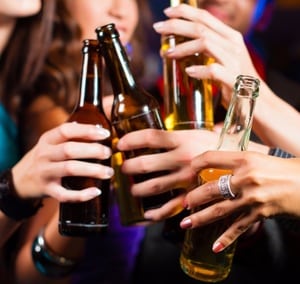Dram shop laws relate to cases in which a person has received alcohol from an establishment and then causes an accident while in an intoxicated state. Dram shop laws allow victims who were hurt by the intoxicated driver to pursue compensation from the establishment or party that provided alcohol to the intoxicated driver.
What Is a Dram?A dram is a small unit of measurement that bars and taverns used to sell alcohol in. Bars and taverns would sell a dram of alcohol to a customer.
What Is Dram Shop Liability?
Dram shop liability relates to the civil liability that can be imposed against a bar or tavern. Dram shop liability may also extend to other establishments that serve alcohol, such as restaurants or clubs. Dram shop liability means that a bar or other establishment may be held liable for civil damages if it provided alcohol to a patron who later got into an accident and harmed someone else.
Purpose of Dram Shop Liability
When a drunk driver causes an accident, the results are often catastrophic. Since alcohol intake is linked with inhibited judgment and delayed reactions, a drunk driver who causes a crash may be traveling at a higher speed than a driver who is more alert. As such, the policy limits on an insurance policy may not be adequate to fully compensate a victim for the injuries that he or she suffers. Dram shop liability allows an accident victim to pursue compensation from a business with deeper pockets in order to receive compensation for the injuries that he or she has suffered.
Dram Shop Laws
Dram shop laws are implemented on the state level. Each state decides how much or little it wants the establishment to be held liable for the acts of a drunk driver. Some legal differences between state laws include:
The Legal Standard
The legal standard in dram shop liability cases may be different. The plaintiff’s burden of proof is usually to show that the establishment was negligent. However, the statute may include relevant information that can help establish negligence. Typically, the plaintiff has to show that the person who was serving alcohol to the patron knew or should have known was drunk. Other factors that may demonstrate negligence include evidence that the server did not request proof of age, the establishment served a patron after closing time or the server served someone a certain amount of alcohol during the time that he or she was there that would have reasonably resulted in intoxication.
Some states provide enhanced damages to the victim if the plaintiff shows that the defendant acted recklessly. This is unreasonable action that is caused when a person knew or should have known that the action was unreasonably safe but still took part in the action anyway.
Liability
Some states only make dram shops liable if the person who caused the accident was underage. Other states set damage caps on any awards. A damage cap reduces the award that a jury provides to a specific limit, such as $250,000.
Notice Requirements
Some states have strict notice requirements that mandate that a person considering bringing forth a dram shop action notify the dram shop within a certain period of time. This limit may be as little as 60 days from the date of the accident.
Social Host Liability
Some states also have social host liability laws that operate in a manner similar to dram shop laws. However, these laws extend to individuals who serve alcohol in their home or at their function, normally private parties instead of businesses. Social hosts with these laws can be held liable if they served alcohol to a guest who later caused an accident.
Defenses
Dram shop laws may provide a number of affirmative defenses that the establishment can use to try to defend the case. For example, the bar may be able to show that it acted in a reasonable manner by providing evidence that servers receive education on alcohol intake and serving, the bar has nonalcoholic beverages available or the bar encourages customers to use a taxi or rideshare program to be safe.
Legal Assistance
Due to the possibility of short notice requirements, it is important that an accident victim speak immediately to a personal injury lawyer to preserve his or her rights. A personal injury lawyer can discuss the laws in the state where the action is brought and how they may affect a claim. He or she can also ensure that a lawsuit is filed within the relevant time frame to avoid passing the statute of limitations. He or she can also retain the services of an alcohol expert who can explain to a jury the effect alcohol has and when these effects may become evident.



